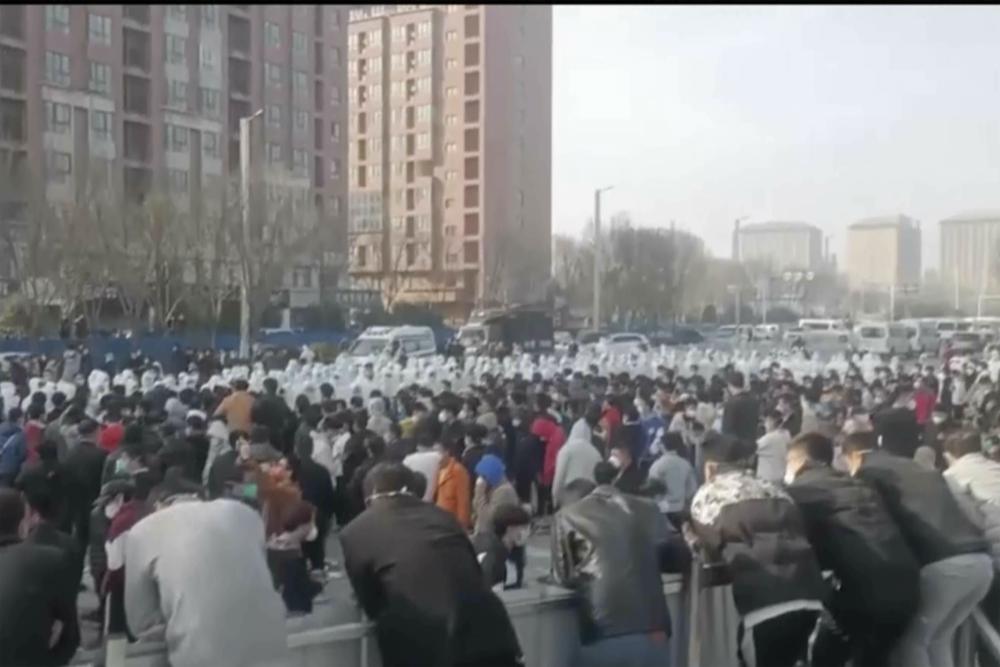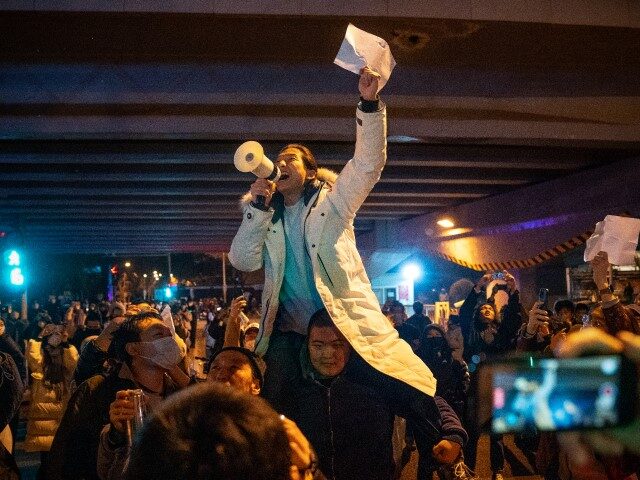The Chinese Communist Party’s media arms finally acknowledged on Wednesday a wave of anti-regime protests that swept the nation over the weekend – an eruption of public dissent preceded by nearly two years of regular, but isolated, protests – blaming unspecified “hostile forces” for creating artificial discord.
Crowds of hundreds of protesters congregated throughout the weekend in some of China’s major cities – most prominently in Beijing, Shanghai, Guangzhou, and Zhengzhou – demanding an end to the regime’s “zero-Covid” policy, which utilizes mass house arrest and lockdown protocols to allegedly contain the spread of Chinese coronavirus. Chinese officials have repeatedly claimed to have “optimized” their brutal policies but have done little to change them in practice, “advising” residents, under threat of authoritarian communist law, not to leave their homes rather than welding their doors shut. The protesters have not limited themselves to condemning coronavirus policies, but have also employed slogans against communism and dictator Xi Jinping generally.
Prior to the protests this weekend, what were once rare displays of dissent had slowly become regular occurrences nationwide in the last year. While some were small – one man notably displayed a massive banner on Beijing’s Sitong Bridge last month reading, in part, “traitor dictator Xi Jinping” – others have involved hundreds of people, most prominently an ongoing riot at the world’s largest iPhone factory in Zhengzhou.

In this photo provided Nov 23, 2022, protesters face off against security personnel in white protective clothing at the factory compound operated by Foxconn Technology Group, which runs the world’s biggest Apple iPhone factory in Zhengzhou in central China’s Henan province. (AP)
The NGO Freedom House described protests against the regime in China as a “daily” occurrence in the country this month.
The state-run propaganda outlet Global Times appeared to address the protests in an article on Wednesday describing the Communist Party response to “criminal acts disturbing social order.” The Times reported that the Party’s “Commission for Political and Legal Affairs” held an emergency session on Monday to address the “criminal acts,” without specifying that it meant the anti-regime protests. In the session, the communists proposed helping solve “practical difficulties” faced by Chinese citizens to prevent the “criminal acts,” a recognition that Communist Party incompetence, at least on a local level, was fueling the protests.
“Political and legal organs should promptly dredge and resolve conflicts and disputes to help solve people’s practical difficulties,” the political commission reportedly ordered, and “resolutely crack down on infiltration and sabotage activities by hostile forces and illegal and criminal acts that disrupt social order.”
The Party organ also demanded communists “maintain overall social stability,” presumably meaning putting an end to any dissident behavior.
The Global Times noted that Party officials were acting in response to what they believed to be a threat to “national security.”
The Chinese Foreign Ministry has yet to formally address the protests in any meaningful way. Asked about them on Tuesday – and if the Chinese government was considering an end to its brutal “zero-Covid” policy – Foreign Ministry spokesman Zhao Lijian after a prolonged silence asked, “Can you repeat the question?” and then offered an apparent denial that the protests were happening at all.
“What you mentioned does not reflect what actually happened,” he replied.
The exchange did not appear in the Foreign Ministry’s official transcript of that day’s briefing.
Awkward silence: China official @zlj517 speechless after question on ongoing peaceful protests in China #WhitePaperRevolution #ChinaUprising #XiJinping pic.twitter.com/bcA0Eg4nms
— Kalsang Jigme བོད། (@kalsang_jigme) November 29, 2022
The British agency Sky News published a report on Wednesday translating what appeared to be a deluge of propaganda from the Chinese state surfacing on Weibo, a government-controlled social network, blaming the United States for the protests. No evidence has surfaced tying any of protests or their participants to the American government.
“I understand the rally organized this time was by … the Ministry of Foreign Affairs of America,” one Weibo user definitively proclaimed, offering no evidence. America does not have a “ministry of foreign affairs.”
Some pro-regime users shared as “evidence” of American intervention in the protests a job ad from the CIA seeking Mandarin language speakers. Others simply insulted Chinese citizens who disapprove of their state’s human rights violations.
“Whoever introduces external forces to get involved is a complete traitor!” one user reportedly wrote.
While pro-regime users are flooding Weibo with insults and wild claims of foreign attack, on Twitter, Chinese bots have taken to filling hashtags with the names of the cities that experienced protests with pornographic materials to drown out authentic coverage or discussion of the protests.
Evidence began to surface on Tuesday that the Communist Party’s orders to “resolutely” crack down on protests had already yielded action. In Shanghai, locals complained of police seizing the mobile phones of random people on the street and searching their cameras for protest footage, deleting anything presumed damaging to the regime. In Beijing, residents objected to police swarming plazas and other public areas and whisking away suspected protesters.
“There are just too many police. Police came to check the ID of one of my friends and then took her away. We don’t know why. A few hours later they released her,” an anonymous alleged protester told Reuters.
Protests persisted, however. On Tuesday evening, protesters swarmed Beijing’s Sitong Bridge – where a protester identified as “Peng” hung a banner calling dictator Xi Jinping a “traitor” and “dictator” in October – holding up blank papers in protest and calling for an end to communism.
At #SitongBridge in #Beijing today. The #BlankPapersRevolution is still going on and drivers also honk to support.
Why SitongBridge? Watch my show to find out https://t.co/dslW1BCq1l#China #ChinaUprising #ChinaRevolution #chinacovidprotest #ChinaProtests2022 pic.twitter.com/xCTYzBYpTW— Jennifer Zeng 曾錚 (@jenniferzeng97) November 30, 2022

COMMENTS
Please let us know if you're having issues with commenting.